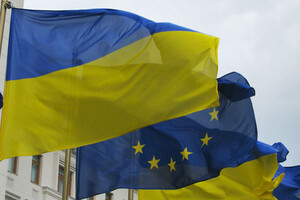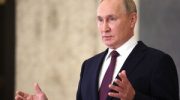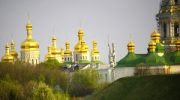Ukrainians are fighting not only for their own country, but for the whole of Europe, strongly reminding the EU why it was founded in the first place.

If anyone is interested in how powerful the power of the European dream is now, he should not go to Paris or Rome, Brussels or Berlin. It is worth going to Kyiv.
“Last October, I visited the city, where I talked to young and ambitious Ukrainians. They told me about their country's biggest dream – to become a member of the European Union. For these young people, the EU has become synonymous with democracy and freedom, progress and prosperity. When I told them that most students in my home country, the Netherlands, found the EU boring and bureaucratic, they did not believe it. In the last few weeks, I have been thinking a lot about these Ukrainian students. They and their compatriots are ready to die for what we take for granted, ”writes The Atlantic Dutch writer and philosopher Rutger Bregman.
Since the beginning of the Russian invasion in February, millions of Ukrainians have gone to defend not only their country but also Europe. They have become a powerful reminder to the EU why this organization was founded in the first place. After World War II, we realized that we needed to work together. Our slogan was “Never again.” What began as the European Coal and Steel Community has grown into the modern European Union. But how quickly Europeans got used to it.
“Every milestone in the development of civilization begins as a utopian ideal. But as soon as the dream becomes a reality, we forget how incredible these changes once seemed. And those who forget become complacent. That is how the union of 28 countries (of which there are now 27) began to move away from their own ideals, “wrote the Dutch philosopher.
He accuses Europe of preaching human rights by neglecting the rights of refugees at its borders. It introduced austerity measures at a time when investment was urgently needed. In northern Europe, leaders have lost their sense of solidarity with their counterparts in the south. And in the south, democracy has been paused. This is what happens if the EU is seen solely as an economic project and not an association with common values.
“We have heard German politicians complain about lazy Greeks, although the Greeks actually have the longest working week in Europe. We have heard Dutch politicians mutter that the southern countries need to collect more taxes, when in fact the Netherlands is the largest tax offshore in the world. And we heard the British complain about absolutely everything until they left, “the article reads.
Yet it was in the years after the European debt crisis a decade ago that the spirit of the times began to change, reminding Europe of its ideals and potential. This was most noticeable in the fight against global warming. 16-year-old schoolgirl Greta Thunberg started a one-man protest in front of the Swedish parliament, after which a whole movement arose. Thus, the issue of climate change has been at the epicenter of all election campaigns in Europe.
Read also: Slovakia will insist on Ukraine's accession to the EU as soon as possible – Heger
However, Bregman points to European mistakes. In particular, the continent has become dependent on cheap Russian gas, neglected its defenses and too often blamed the “Eurocrats” in Brussels for all the failures of policy at the national level. However, there is a reason why most young Britons do not want their country to leave the EU. And now we would like to return. There is a reason why Ukrainian students have been dreaming for many years that their country will join the EU.
The new generation is aware that Europe can and must become a landmark for the world. That the era of reckless austerity is over and now we need to start large-scale investment. What is needed is solidarity between rich and poor, young and old, north and south, east and west. That there is no inevitable need to make concessions to national sovereignty for the sake of European integration. It's just that European countries become stronger if they work together. The continent's extraordinary progress in the fight against climate change illustrates not only Europe's ability to set standards and fine-tune rules, but also European values and the ability to invest, stand in solidarity and cooperate.
It is also worth remembering that the Russian invasion of Ukraine in 2014 and the annexation of Crimea began after Kyiv signed an association agreement with the EU. Ukrainians are faced with a simple choice: either Putin's dictatorial model or the European Union's democratic model. The choice was obvious. Until 2014, Ukrainian exports were the same: to the EU and to Russia. In subsequent years, exports to the EU doubled, and in Russia – atrophied. More and more Ukrainians visited European countries because there was no need to open visas. In short, Ukraine has chosen Europe. And Putin has decided that this is unacceptable.
“Now is the time for us to choose Ukraine. Yes, the path to EU membership is usually long and difficult, and for good reason. But these are not normal times. Millions of brave Ukrainians have breathed life into European ideals: freedom, democracy and cooperation – by paying for it with their lives, “the author writes.
Read also: Ukraine will join the EU in the coming years – Zhovkva
He emphasizes that European values and principles oblige the continent to abandon Russian gas imports as soon as possible, and to support Ukraine in its battle for independence in all possible ways, to accept refugees and launch a “Marshall Plan” to rebuild Ukraine when war will end.
“Finally, we must open the door for Ukraine to join the EU. In the dark days of the war, one thing is for sure: Ukraine's future in Europe. Our common future in Europe. As an American would say, “Ich bin ein Europäer,” says the Dutch philosopher, alluding to the famous words of US President John F. Kennedy, who in 1963 called himself a “Berliner” in German during a speech at the Berlin Wall.


